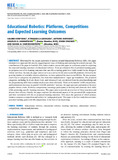| dc.contributor.author | Evripidou, S. | |
| dc.contributor.author | Georgiou, K. | |
| dc.contributor.author | Doitsidis, L. | |
| dc.contributor.author | Amanatiadis, A. A. | |
| dc.contributor.author | Zinonos, Zinon | |
| dc.contributor.author | Chatzichristofis, Savvas A. | |
| dc.date.accessioned | 2021-03-01T13:03:44Z | |
| dc.date.available | 2021-03-01T13:03:44Z | |
| dc.date.issued | 2020-12-04 | |
| dc.identifier.issn | 2169-3536 | |
| dc.identifier.uri | http://hdl.handle.net/11728/11734 | |
| dc.description.abstract | Motivated by the recent explosion of interest around Educational Robotics (ER), this paper attempts to re-approach this area by suggesting new ways of thinking and exploring the related concepts. The contribution of the paper is fourfold. First, future readers can use this paper as a reference point for exploring the expected learning outcomes of educational robotics. From an exhaustive list of potential learning gains, we propose a set of six learning outcomes that can offer a starting point for a viable model for the design of robotic activities. Second, the paper aims to serve as a survey for the most recent ER platforms. Driven by the growing number of available robotics platforms, we have gathered the most recent ER kits. We also propose a new way to categorize the platforms, free from their manufacturers' vague age boundaries. The proposed categories, including No Code, Basic Code, and Advanced Code, are derived from the prior knowledge and the programming skills that a student needs to use them efficiently. Third, as the number of ER competitions, and tournaments increases in parallel with ER platforms' increase, the paper presents and analyses the most popular robotic events. Robotics competitions encourage participants to develop and showcase their skills while promoting specific learning outcomes. The paper aims to provide an overview of those structures and discuss their efficacy. Finally, the paper explores the educational aspects of the presented ER competitions and their correlation with the six proposed learning outcomes. This raises the question of which primary features compose a competition and achieve its' pedagogical goals. This paper is the first study that correlates potential learning gains with ER competitions to the best of our knowledge. | en_UK |
| dc.language.iso | en | en_UK |
| dc.publisher | IEEE | en_UK |
| dc.relation.ispartofseries | IEEE access;vol. 8, pp. 219534-219562, 2020 | |
| dc.rights | © Copyright 2021 IEEE - All rights reserved. | en_UK |
| dc.rights.uri | http://creativecommons.org/licenses/by-nc-nd/4.0/ | en_UK |
| dc.subject | Research Subject Categories::TECHNOLOGY | en_UK |
| dc.subject | Research Subject Categories::TECHNOLOGY::Information technology | en_UK |
| dc.subject | Educational robotics | en_UK |
| dc.subject | educational robotics learning outcomes | en_UK |
| dc.subject | educational robotics competitions | en_UK |
| dc.subject | educational platforms | en_UK |
| dc.title | "Educational Robotics: Platforms, Competitions and Expected Learning Outcomes" | en_UK |
| dc.type | Article | en_UK |
| dc.doi | 10.1109/ACCESS.2020.3042555 | en_UK |


